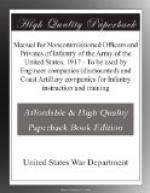Enlisted men should be very careful to observe all the sanitary regulations of the camp. Flies are the greatest spreaders of camp disease. All fecal matter and food should be carefully guarded from them. In camps extreme precautions are taken to screen the sinks and kitchens from flies, and all enlisted men should cooperate in the effort to make these precautions successful. One fly carrying germs on his feet from the sinks to the food can start a serious and fatal epidemic in a camp. Defecating on the ground in the vicinity of camp or urinating in camp are extremely dangerous to the health of the command, and are serious military offenses. At night a urinal can is provided in each company street.
In a permanent camp cots or bed sacks are usually provided for the men to sleep on. In a shelter tent camp beds should be made of hay, grass, leaves, pine or spruce boughs, or pine needles, on top of which the poncho and blanket are spread, thus softening the ground and keeping the sleeper away from the cold and dampness. Neglect to prepare the bed when sleeping without cot or bed sack means a loss of sleep, and may lead to colds, bowel disorders, and rheumatism.
In wet weather tents should be ditched, and in windy or cold weather dirt may be banked around them. A place for washing the person and clothes should be arranged for in each company street, and the waste water disposed of by means of drainage or rock-filled pits. In dry weather the streets in camp should frequently be sprinkled with water to keep down the dust. This is specially necessary around the kitchen.
CHAPTER VIII.
TARGET PRACTICE.
SECTION 1. PRELIMINARY TRAINING IN MARKSMANSHIP.
Effective rifle fire is generally what counts most in battle. To have effective rifle fire, the men on the firing line must be able to HIT what they are ordered to shoot at. There is no man who can not be taught how to shoot. It is not necessary or even desirable to begin instruction by firing on a rifle range. A perfectly green recruit who has never fired a rifle may be made into a good shot by a little instruction and some preliminary drills and exercises.
Before a man goes on the range to fire it is absolutely necessary that he should know—
1. How to set the rear sight. 2. How to sight or aim. 3. How to squeeze the trigger. 4. How to hold the rifle in all positions.
If he does not know these things it is worse than useless for him to fire. He will not improve; the more he shoots the worse he will shoot, and it will become more difficult to teach him.
SECTION 2. SIGHT ADJUSTMENT.
Men must be able to adjust their sights correctly and quickly. An error in adjustment so small that one can scarcely see it on the sight leaf is sufficient to cause a miss at an enemy at 500 yards and over.




